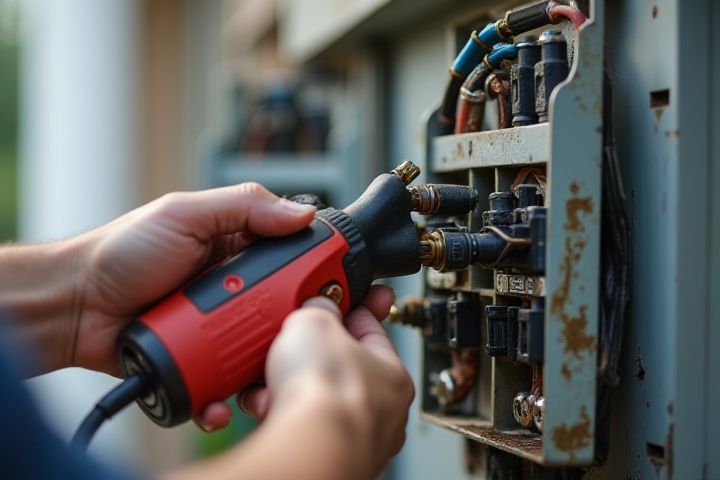
Rewiring your house may be necessary if you experience frequent circuit breaker trips, flickering lights, or if your home has outdated wiring materials like knob-and-tube systems. Inspecting your electrical panel is crucial; a panel that cannot handle your current power needs can lead to safety hazards. Hiring a licensed electrician can help assess your specific situation and ensure that all local building codes are met. Modern rewiring can improve energy efficiency, potentially lowering electricity bills and enhancing the safety of your home. Consider your future plans, as an updated electrical system will better accommodate additional appliances, smart home devices, or renovations.
Should I Rewire My House
Electrical Safety Standards
Rewiring your house is essential for maintaining compliance with Electrical Safety Standards, which are designed to minimize fire hazards and ensure safe electrical functioning. Homes built before 2000 often have outdated wiring that may not support modern electrical loads, making a rewire vital for safety and efficiency. Depending on the size of your home, rewiring can cost between $3,000 and $8,000, but this investment significantly reduces the risk of electrical malfunctions. By prioritizing electrical safety in your home, you protect both your property and the wellbeing of your family.
Upgrade for Increased Power Demand
If you're experiencing frequent tripped breakers or dimming lights, your home's electrical system may not be equipped to handle modern power demands. Upgrading to a higher-capacity panel can significantly enhance your ability to power multiple devices simultaneously. Consider installing new wiring that meets current electrical codes, possibly with dedicated circuits for high-demand appliances. Consulting a licensed electrician will help ensure your upgrade addresses your specific needs while enhancing safety and reliability.
Energy Efficiency
Rewiring your house for energy efficiency can significantly reduce your energy bills, potentially saving you 10-30% annually. Upgrading to energy-efficient wiring and appliances may lead to a long-term reduction in carbon footprint, promoting sustainability. Potential tax credits or rebates for energy-efficient upgrades can offset initial costs, making the investment even more attractive. Consulting with a licensed electrician can provide valuable insights tailored to your home's specific electrical needs and future energy goals.
Wiring Aging and Wear
Wiring aging and wear can significantly impact the safety and efficiency of your home's electrical system. With the National Fire Protection Association reporting that faulty wiring contributes to about 67,000 home fires annually, it's essential to assess your current wiring if your home is over 20 years old. Signs of aging include frequent circuit breaker trips, dimming lights, and frayed wires, all indicating it might be time for a professional evaluation. Prioritizing a rewiring project can enhance electrical safety, reduce energy consumption, and ultimately improve the overall functionality of your home.
Compliance and Code Updates
Rewiring your house is essential, especially if it was built before 2000, as it may not comply with the latest National Electrical Code (NEC) standards. Homes accommodating outdated wiring often risk overheating or electrical fires, with over 51,000 fires reported annually due to electrical malfunctions. Compliance with local building codes ensures your electrical system can handle modern power demands, such as high-efficiency appliances and smart home technology. By investing in a complete rewiring job, you enhance safety, efficiency, and potentially increase your home's value by up to 20%.
Advanced Smart Home Integration
Rewiring your house for advanced smart home integration can significantly enhance your home's functionality and efficiency. Investing in a comprehensive electrical system can accommodate smart devices, offering benefits like energy monitoring, automated lighting, and enhanced security features. With an estimated 50 billion connected devices projected by 2030, upgrading your electrical infrastructure ensures compatibility and future-readiness. Consider the long-term savings on energy bills and increased property value as compelling reasons to pursue this upgrade.
Improved Electrical System Reliability
Rewiring your house can significantly enhance electrical system reliability, reducing the risk of outages and electrical fires. Older wiring, particularly if it's aluminum or outdated copper, may not support the demands of modern appliances and electronics, which can lead to overheating and safety hazards. Investing in a complete rewiring could cost between $1,500 and $10,000, depending on your home's size and wiring complexity, but it ensures compliance with current electrical codes. By prioritizing an upgraded electrical system, you enhance not only safety but also overall energy efficiency in your home.
Resale Value and Marketability
Rewiring your house can significantly enhance resale value, often increasing market appeal by up to 10%. Modern electrical systems not only ensure safety but also meet the expectations of potential buyers, who prioritize updated infrastructure. Homes with outdated wiring may deter offers or lead to lower offers, while properties equipped with energy-efficient lighting and smart home technology are more attractive in today's market. Investing in a professional rewire can yield a return on investment of approximately 75% when you sell your home.
Professional Assessment Required
A professional assessment is essential when considering rewiring your house, as it ensures compliance with current electrical codes and safety standards. Licensed electricians can evaluate the condition of your existing wiring, identify potential hazards, and suggest necessary upgrades tailored to your home's specific needs. Moreover, this assessment can help you understand the implications of outdated systems, such as the risk of electrical fires or insufficient power for modern appliances. By prioritizing a professional evaluation, you can make informed decisions about your home's electrical system, enhancing safety and efficiency.
Cost and Budget Considerations
Rewiring your house can cost between $1,500 and $10,000, depending on the size and age of your home, as well as local labor rates. Consider budgeting around $6 to $8 per square foot for materials and wiring, which can significantly impact your total expenses. It's crucial to factor in potential upgrades, such as replacing the electrical panel, which can add $1,500 to $3,000 to your overall budget. If you're planning to sell your home within the next few years, investing in modern wiring may yield a return of 50% to 75% on your investment, enhancing your home's marketability.
